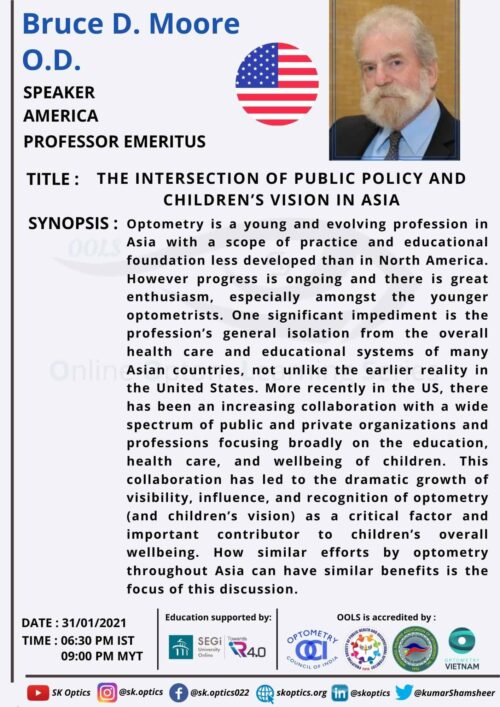
Dr. Bruce Moore, Professor Emeritus in pediatrics at the New England College of Optometry in Boston USA, begins by examining the vision care systems extant in Asia and their current deficits.
He discusses the potential role of optometry in eye care and how potentially, ophthalmic patient care in Asia can be elevated by visualizing a health care pyramid, with optometry fully integrated into a systematic approach.
He then discusses the current status of optometry in Asia as being young and evolving. He outlines the major problems with current training and the evolving standards of care. Optometry in Asia appears to be somewhat insular and insecure as the role of an optometrist is not well understood or integrated into the overall healthcare system.
Dr. Moore then identifies the vast pediatric population in Asian countries and the ever-growing need for pediatric eye care due to the myopia epidemic and the routine needs of primary eye care.
We learn how preventable vision loss can be reduced in conditions like amblyopia and uncorrected refractive error and their developmental and educational consequences that can lead to significant economic and social problems for the family, the community, and the nation. Advanced training in pediatric optometry can improve eye care for children in a broader public health context.
There are multiple opportunities for the advancement of the profession. Optometry needs to become more independent and improve its standards. The efforts of national and international optometric associations need to be supported and promoted. As a profession, optometry needs to engage both locally and nationally in driving professional growth and awareness.
Optometrists need to spread the scope of practice beyond the narrow confines of just providing primary eye care. Critically, the profession must engage with other professions, including primary pediatric health care and education. The general population and government need to become aware of the importance of vision in children.
The talk is summarized by detailing the roles that optometry need to expand and integrate into the national healthcare and educational systems. The session ends with a question and answer segment with the live audience.
